be good at与do well in的用法与区别的相关内容
小升初英语必背短语(知识清单)-人教PEP版英语六年级下册
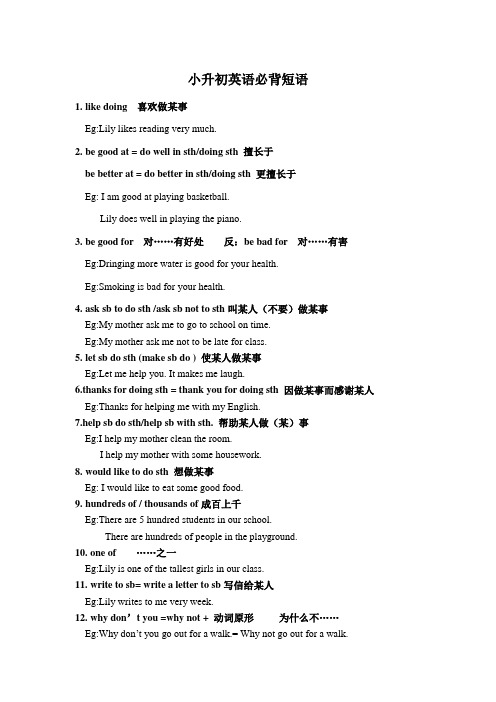
小升初英语必背短语1.like doing 喜欢做某事Eg:Lily likes reading very much.2.be good at = do well in sth/doing sth 擅长于be better at = do better in sth/doing sth 更擅长于Eg: I am good at playing basketball.Lily does well in playing the piano.3.be good for 对……有好处反:be bad for 对……有害Eg:Dringing more water is good for your health.Eg:Smoking is bad for your health.4.ask sb to do sth /ask sb not to sth叫某人(不要)做某事Eg:My mother ask me to go to school on time.Eg:My mother ask me not to be late for class.5.let sb do sth (make sb do ) 使某人做某事Eg:Let me help you. It makes me laugh.6.thanks for doing sth = thank you for doing sth 因做某事而感谢某人Eg:Thanks for helping me with my English.7.help sb do sth/help sb with sth. 帮助某人做(某)事Eg:I help my mother clean the room.I help my mother with some housework.8.would like to do sth 想做某事Eg: I would like to eat some good food.9.hundreds of / thousands of成百上千Eg:There are 5 hundred students in our school.There are hundreds of people in the playground.10.one of ……之一Eg:Lily is one of the tallest girls in our class.11.write to sb= write a letter to sb写信给某人Eg:Lily writes to me very week.12.why don’t you =why not + 动词原形为什么不……Eg:Why don’t you go out for a walk.= Why not go out for a walk.13.something important 一些重要的事情不定代词+形容词14.it’s time to do sth= it’s time for sth.是时候做某事了Eg:It’s time to have lunch.= It’s time for lunch.15.be like问性格,look like 问外貌be like 范围更大一些,有时候既问性格也问外貌Eg:What's your sister like? 你姐姐怎么样?/你姐姐是怎样一个人?She is kind. 她很善良。
2023年七年级下册英语期中考复习知识点精编版

U1-U6单元期中考试重要复习点Unit 1 Can you play the guitar?1.Can you play the guitar? can+动词原形,它不随主语和数而变化。
Can he play the guitar? Yes, he can./No, he can’t play the guitar.She can speak English very well.2.Play + 球类运动 play + the +乐器 Play basketball/play the guitar/play chess3.want的用法:想做某事want to do sth I want to join the music club.4.good的短语: be good with sb 善于应付...的;和……相处的好She is good with the old people.be good at 擅长 (1) be good at +sth (2) be good at doing sth(1) I am good at English. (2) He is good at swimming.Be good for 对....有好处 It is good for health.5.Tell 的用法:(1) tell sb sth. (2) tell sb to do sthTell stories 讲故事 story-telling club 故事俱乐部6.Talk 的用法:(1) talk to sb. (2) talk with sb (about sth.)Talk to your parents./ He talks with me about soccer.7. Or 的用法:(1)“或者”,放在否认句中I don’t like pears or bananas.(2) “还是”,放在选择疑问句中 Is he a student or a teacher?8. Need to do sth. 需要做某事 I need to go to school at six.9.几个短语: make friends with sb 和某人交朋友 on the weekend/on weekends在周末At the old people’s home 在敬老院里 English-speaking students 说英语的学生 Unit 2 What time do you usually go to school?1.what time和when引导的特殊疑问句。
good与well的用法区别

good与well的用法区别
I’m very .Thank you.
A.good
B.well
(是人品好还是身体好?你选哪个答案?)
Good 与well都可以表示“好”的意思,它们主要有如下区别:
1、good是形容词,well是副词,前者修饰名词,后都修饰动词。
(1)Let's hope we have good weather tomorrow. 希望明天是个好天。
(修饰名词weather)
(2)This little girl plays the violin very well. 这个小女孩钢琴弹得很好。
(修饰动词plays)
2、well也可以作形容词,专指“身体好”,相当于fine,但good不能指身体好。
(3)He is very well . 他身体很好。
(4)He is very good. 他人很好。
(5)Sorry, my English is not very good. 对不起,我的英语不太好。
3、well还在作感叹词,用来表示强调或犹豫。
(6)Well, I’ve had enough and I’m going home! 好吧,我受够了,我要回家了!(强调)
(7)Well, let’s see now. I could meet you on Thursday. 呃……让我想一想,我可以在星期四见你。
4、well的常用短语:
(1)as well:也;同样地;还不如
(2)as well as:也;和…一样;不但…而且
(3)do well in:在……方面做得好,擅长。
2016年版仁爱英语八年级上册unit 1 topic 1 重点知识点总结及练习

Unit 1 Playing SportsTopic 1 I’m going to play basketball.一.重要句型:Section A1. I often saw you play basketball during the summer holiday. 在暑假期间,我经常看见你打篮球。
1)A. see sb. do sth. 意为“看见某人做了某事”。
强调动作的全过程或经常反复发生,现在动作已完成;. I often see Tom p lay basketball on the playground. 我经常看见汤姆在操场上打球。
B. see sb. doing sth. 意为“看见某人正在做某事”。
强调动作正在进行。
. I see Tom playing basketball on the playground yesterday. 我看见汤姆在操场上打球。
2.We are going to have a basketball game against Class Three on Sunday. 周日我们班和三班要举行一场篮球比赛。
1)be going to +动词原形是将来时的一种表达法,表示主语将要进行某一行动的打算、意图,且这种打算会付诸实践。
. — What are you going to do tomorrow 明天你打算做什么—I’m going to play soccer. 我打算踢足球。
2)against 意为“对着,反对。
”. He walked against the wind. 他逆风行走。
We are against wars. 我们反对战争。
3.I hope our team will win. 我希望我们队会赢。
1)A. hope + that从句,that 可省去。
. I hope that I can see you soon. 我希望我可以很快见到你。
人教版八年级英语上第六单元知识点

八年级英语上册unit6知识点复习问知教育乐宗宏辅导讲义一习惯用语:look the same=look like 看起来像 in some ways在某些方面as you can see 正如你能看到的 look different 看起来不同in common 共同的 as +<形容词/副词原级> +as …与…一样not as/so…as……不如… more than=over 多于;超过be good at=do well in sth./doing sth.爱好于… make sb. +do 使某人…have good grades 成绩优良 be good with sb. 善于与某人相处call…at +电话号码拨…找… stop doing sth. 停止做某事stop to do sth. 停下来做某事 begin with..以…开始most of……中的大多数 primary school 小学both…and…两者都 laugh at…嘲笑…my twin sister 我的双胞胎姐姐 be outgoing 爱抛头露面short hair 短发 more athletic 更健美 the same as 同……一样lots of 许多 3 centimeters taller 高了三厘米二重点句型:1.I'm more outgoing than my sister.我比我妹妹更爱出风头..2.He has shorter hair than Sam.他的头发比山姆的短..3.Tom is more athletic than Sam.汤姆比山姆更健美..4.Liu Ying is not as good at sports as her sister.刘莹不如她姐姐擅长体育.. 5.Both girls go to lots of parties.两个女孩都参加了许多晚会..6.In some ways we look the same;and in some ways we look different.在某些方面;我们看起来一样;在某些方面;我们看起来不同..7.My good friend is good at schoolwork.我的好朋友爱好干学校事务..8.I think a good friend makes me laugh.我认为好朋友会使我发笑..9.I'm about 3 centimeters taller now.我现在比以前高了大约三厘米..三词语点击:1.outgoing: a tg①形容词adj. 外向的;友好的;开朗的; 直率的Would you say that you were an outgoing person 你认为你外向吗②名词 n.出发;出外;常用复数开支;费用积累 outgoing的反义词是introverted内向的;矜持的;寡言的2.serious: 'si ri s 形容词 adj. 严重的;危急的;令人担心的; 严肃的;庄严的..His error is serious. 他的错误很严重..He was kind and affectionate; but very serious. 他仁慈、亲切;但非常严肃..拓展seriuos 的名词形式为;其副词形式为.He is joking. Don't .他是跟你开玩笑呢.. 你别当真..When people ask you to do something;you should .人家托你的事; 你别不在意..3.mean: mi:n动词 v.言词等表示...的意思; 意欲;意图;打算;What does the phrase mean这短语是什么意思I realized what he meant.我明白他的意思了..Do you mean to go without money你想身无分文就走吗拓展1问某物是什么意思可用“What do …mean”等于“What do you mean by…”或“What′s the meaning of…” meaning是mean的名词形式..例如:What does the word mean= What′s the meaning of the word或What do you mean by saying the word2means意为“手段;方法;工具”;单复数同形词尾永远有-s..若用作主语;其谓语动词的数根据句意来确定..例如:Every means has been tried;but we find only by this means can we do it well.每种方法都试过了;但我们发现通过只有这种方法才能做好..后半句为倒装句4.as: z; z一as作副词;表示程度;意为“同样地”..在“as…as…”;“not as/so…as…”结构中的第一个as是副词;第二个as 是连词;作“和/与…不一样”解..Jack is as tall as his father is.杰克和他的父亲一样高..二as作介词:①作“如;像”解..类似于like.. eg: They got united as one man.他们团结得像一个人一样..②作“充当;作为”解..;eg: as a writer;He was famous./ he was famous as a writer.作为作家;他是很有名的..He came to China as a tourist five years ago.他五年前以游客的身份来过中国..三as作连词的用法1几个关于as...as的常见句型:1as...as possible Please answer my question as soon as possible.请尽快回答我的问题.. 2as...as usual/before She looks as pretty as before.她看起来和以前一样漂亮..3as well as She cooks as well as her mother does.她烧菜烧得跟她母亲一样好..一些带有as...as结构的常见短语归纳:as busy as a bee像蜜蜂一样忙碌as easy as ABC像ABC一样容易as deep as a well像井一样深 as light as a feather像羽毛一样轻2.as用作连词引导时间状语从句as与when;while都是引导时间状语从句的从属连词;含义都是"当……的时候"..但它们有区别:用when时;从句的动作可以与主句的动作同时发生;也可以先于主句的动作发生;用while时;从句的动作为一过程;主句动作与从句动作同时进行或在从句动作过程中发生;用as时;主句和从句的动作同时发生;具有延续的含义..例如:1It was snowing when he arrived at the construction site.他到达工地时;天正在下雪..2He was watching TV while his mother was cooking.他母亲做饭时他在看电视..3 You will grow wiser as you grow older.你会随着年龄的增长而越来越聪明..3as用作连词引导原因状语从句as;because;since都可以表示因果关系;连接原因状语从句;含义是"因为;由于";但它们有区别:because表示的语气最强;as一般放在句首;语气较弱;较口语化;since常常用在书面语中;表示多为对方已知的、或稍加分析便可得知的原因;有时可译作"既然"..例如:1 He will succeed because he is in earnest.他一定会成功;因为他很认真..2 Since you are so sure of it he′ll believe you.既然你对此如此有把握;他会相信你的..3 As rain has fallen; the air is cooler.因为下过雨;空气比较清爽..四as的其他几个用法;①用于the same...as结构This is the same book as I read last week.这本书和我上周读的那本是一样的..②用于such...as结构中I don′t like such books as he recommends.我不喜欢他推荐的那些书..而such as作“例如”讲;引出列举项..The farm grows various kinds of crops; such as wheat; corn; cotton and rice. 这个农场种植各种各样的庄稼;例如麦子;玉米;棉花和稻米..③用于"so +adj. + a/an + n. 单数 + as "结构中I am not so strong a man as I was.我已经没有从前那么强壮了5.way: wei 名词 n.①路;通路;道路;方向CCan you show me the way to the post office 你能否告诉我去邮局的路②路程;距离the S It's a long way to the railroad station.到火车站路程很远..③方法;方式C+to-v Scientists are trying to find ways to preventthe disease.科学家们正试图找到防止疾病的方法..④风俗;习惯;风度;作风C I did not like the way he talked to me.我不喜欢他跟我讲话的方式..⑤方面;点C Their plan is recommendable in many ways.他们的计划在许多方面都是可取的..积累 way构成的短语有:on the/one′s way to 在通往/某人去某地的路上;in…way 用……方法; in many ways在许多方面;by the way顺便问/说一句;in the way挡道;碍事6.both: b uθ①形容词 adj. 两...都;两个...都Both his eyes were severely burned. 他的双眼都严重烧伤了..②代词 pron. 两者都;两个都;双方都Why not buy both 为什么不把两件都买下③副词 adv. 并;又;两者皆 We like Amy and Phil both.艾米和菲尔两个我们都喜欢..④连接词 conj. 既...且...;...和...都The prospects both excited and worried me. 这前景既使我激动又令我忧虑..⑤构成both…and…意为“不但……而且……”;若连接两个并列的主语;谓语动词用复数形式;该词组的否定形式为neither…nor…既不……也不……或not…either…or….例如:He can speak both Japanese and French.的否定形式为:He can speak neither Japanese nor French.或 He can′t speak either Japanese or French.直接否定both是一种部分否定;表示“并非两者都”..“部分否定”讲解详见本书第四单元“火眼金睛”中“5.‘否定’也温柔”辨析all ; both; 表示“都”;“全部”..1 both指两个人或物;而all指三个以上的人或物;在句中都可作主语、宾语、表语、同位语或定语..Both of us want to go. 我们两人都想去..All of us should work hard.我们都应努力工作..2 both和all都可直接修饰名词;名词前如有限定词时;其前只能用both of或all of. Both brothers are clever. 兄弟俩都聪明..Both of the books are useful.两本书都有用..3 both和all在句中的位置是位于be动词之后;行为动词之前;如有情态动词或助动词;则位于情态动词或助动词与主动词之间..We are all here. 我们都来了..特别提醒both的反义词是neither; all的反义词是none..Both of us are not doctors. 我们俩并非都是医生.. 部分否定Neither of us is a doctor. 我们俩都不是医生..全部否定All of the books are not helpful. 并非所有这些书都对人有帮助..部分否定7.however: hau'ev r1连接词 conj.然而;可是;不过I feel a bit tired. However; I can hold on.我有点累了;但我能坚持下去..2副词 adv. ①无论如何;不管怎样However hot it is; he will not take off his coat.无论多热;他也不会脱掉外衣..②不管用什么方法However he tries; he never seems able to work satisfactorily.不管他怎么努力;他好像总不能令人满意地工作..③究竟怎样;到底如何: However did you know that 你到底怎么知道那件事的拓展由–ever构成的合成词有:whoever 谁都……;无论谁;whichever 随便哪个;无论哪个;whatever 凡是……的;无论什么;whenever 随时;无论什么时候;wherever 无论哪里;无论到哪里;等等..8.for:1介词 prep. ①为;为了:This letter is for you. 这是你的信..②代替;代表: We used boxes for chairs. 我们用箱子当椅子坐..③因为;由于: I am sorry for what I said to you. 我后悔不该对你讲那些话..④表示时间、距离等达;计:You can see for miles from the roof.你站在屋顶上可以看到数英里之外..⑤对于;关于;在...方面 :I am too old for the job.我年纪太大;做不了这工作..⑥为得到;为赢得:He sent the waiter for some fruit. 他让服务员去拿一些水果..⑦以...为代价;以...交换:He sold his car for 500 dollars. 他以五百元把车卖了..⑧当作;作为: Do you take me for a millionaire 你是不是把我当百万富翁⑨赞成;支持;倾向于Are you for the plan or against it 你是支持还是反对这个计划⑩朝...方向去;往;向: He left for Taipei. 他出发去台北..⑾. 就...而言:She is all right for her age.就年龄而言她还行..2连接词 conj.因为;由于We must start early; for it will take two hours to drive to the airport.我们得早点动身;因为开车去机场得花两个小时..补充说明;只能放在句子后面9.opposite: ' p zit1形容词 adj. ①相反的;对立的+toThey have opposite views on the question.在这个问题上他们持相反的观点..②对面的;相对的+toHis store is opposite to mine.他的店在我的对面..He lives opposite to me. 他住在我对面..There was a garden on the opposite side of the street.街的对面有个花园..2名词 n. 对立面;对立物Cthe S+ofBlack is the opposite of white. 黑色的相反是白色..3介词 prep. 在...对面=across fromThe post office is opposite the bank. 邮局在银行对面..4副词 adv. 在对面;在对过They sat opposite on the lawn. 他们面对面坐在草坪上..10.interest: 'int rist1名词 n.兴趣;关注;爱好; 趣味性; 感兴趣的事物或人; 利益;利害; 利息; 股份;股权I showed my interest in physics.我对物理感兴趣..His two great interests in life are music and painting.他生活中的两大兴趣是音乐和绘画..We work for our common interests. 我们为共同的利益而工作..I borrowed the money at 5% interest. 我以五分利息借了那笔钱..He has an interest in the company.他在这家公司拥有股份..2及物动词 vt.使发生兴趣;引起...的关心Chemistry interests him. 他对化学感兴趣..He interested me in politics. 他使我对政治发生兴趣..注意interest的形容词有两种形式:interested;interesting.它们的用法详见本书第一单元:“火眼金睛”中的“兴趣知多少”..11.though: e u1 连接词 conj.虽然;尽管Though he is rich; his life is not happy. 他虽然很有钱;但生活并不幸福..2副词 adv. 一般放在句尾然而;还是It was a hard job; he took it though. 这是份苦差事;可他还是接受了..积累1though 与 although 引导让步状语从句的比较:though与 although 同义;一般情况下可互相换用..但 although 比 though 更正式;多用于书面体;且多放于句首..在 although 或 though 引导的让步状语从句中;主句不能用but ;但可使用 yet ; still ..例如:Although / Though he is in poor health; yet he works very hard.尽管他身体不好;然而他工作很努力..though 可用在倒装句中;但 although 不能..例如:Although / Though he is clever; he doesn't study well.Clever though he is; he doesn't study well.尽管他很聪明;学习却不好..2though 构成的短语:as though = as if 好像 even though = even if 即使12.care: k1不及物动词 vi. ①关心;担心;在乎;介意+about/forDo you care if I go 如果我去的话;你不介意吧②关怀;照顾+for ③喜欢;愿意;想要+forI don't care for coffee. 我不喜欢喝咖啡..2及物动词 vt. ①对...介意;对...计较+wh-I don't care what they say. 我不在乎他们说什么..②喜欢;愿意;想要+to-vI don't care to go out. 我不想出去..3名词 n. 照料;关怀;小心..常构成短语:take goodcare of=look after┅well好好照顾..例如:The baby needs a lot of care.这个婴儿需要精心照料..13.necessary: 'nes ;s ri1形容词 adj. ①必要的;必需的+for/to Oxygen is necessary for life. 氧气是生命所必需的..②必然的;无法避免的Poor health is a necessary result of over-exertion. 体弱是过度劳累的必然结果..2名词 n. 必要的物品;必需品She has enough money to buy the necessaries of life.她有足够的钱购买生活必需品..注意It′s necessary for sb. to do sth.做某事对某人来说是必要的..例如:It′s necessary for us to learn English well.这句话应该懂吧;切记14.friendship:′frend ip名词n.友情; 友谊; 友好I valued my friendship with my classmates.我珍视我和同学们之间的友谊..A hedge between keeps friendship green. 君子之交淡如水..To our friendship 为我们的友谊干杯Friendship is love with understanding. 友谊是爱加上谅解..Friendship multiplies joys and divides griefs.友谊可以增添欢乐;可以分担忧愁.. Friendship often end in love; but love; in friendship- never.友谊常因爱而结束;爱从不以友谊而告终..Friendship ---- one soul in two bodies.友谊是两人一条心..Friendship cannot stand always on one side. 友谊是双方的事..Friendship should not be all on one side.友谊不该只是单方面的事..积累类似的词有:ownership物主关系 hardship艰苦relationship关系rmation: ;inf 'mei n名词 n报告;消息;报导;情报资料;信息U+about/onThe book contains much useful information. 这本书包含了许多有用的资料..We received information that you had arrived.我们得到了你已抵达的消息..注意information是不可数名词;同学们往往受汉语影响把它误认为可数名词..类似的词还有:news新闻;advice建议;fun乐趣;weather天气;progress进步等等..例如:他取得了很大的进步..误What a great progress he has made正 What great progress he has made1.欲与天公试比“高”:tall与high都有“高的”意思;先加以比较:1说人;动物;树木等有生命的东西;主要用tall;不用high;tall常用来表示同类之中的高者;它用于指由底到顶的高度;尤其是当高度大于宽度或直径的时候..例如a tall man;a tall tree等..2说一个不与地面接触的人和物的高时;要用high;而不用tall;比如人站在树上时;飞机飞上天时..例如:He is high up in the tree. 他高高地爬在树上..The plane is so high in the sky. 飞机在空中这么高..3指建筑物、山时要tall或high都可以;不过high的程度比tall高..4high常用于抽象意义或比喻意义..如:high price; high speed; high position等..4high可作副词;tall不能..5tall的反义词为short; high的反义词为low.2.“聪明”宝宝大比拼:smart;clever;bright与wise四者都是“聪明”的意思;但各自的含义与用法不同:①clever指人或动物的脑子灵活;指做成的事物时;常含有巧妙的意思;②smart与clever同义;但更强调顽皮的一面;③bright通常指年轻人或小孩的聪明;常用于口语;④wise指由于知识、经验丰富及良好的判断能力而正确对待或处理人或事;常用于正式、客气的场合..例如:He is a clever boy.他是个聪明的孩子..That is a clever plan.那是个巧妙的计划..You can't cheat him because he is a smart boy.你骗不了他;因为他是个聪明伶俐的孩子..The bright boy is reading English in the bright room.这个聪明伶俐的孩子在明亮的房间里读英语..a wise saying 至理名言 a wise leader 英明的领袖3.笑声有多脆laugh和smile都是“笑”的意思;都可做动词;又可作名词;但它们的含义不同:laugh一般是有声的笑;可以是大笑.常构成短语laugh at;有“嘲笑”的意思;而smile一般是无声的微笑;通常是好意的微笑;表示善意的或愉悦的心情..The joke made all laugh loudly.这个笑话使所有人开怀大笑..She came in with a smile on her face.她面带微笑走了进来..积累含“笑”的常用语:He who laughs last laughs best. 笑到最后笑得最好..belly laugh 捧腹大笑A man may smile and smile and be villain. 笑里藏奸.A smile sweeps all your sorrows away.一笑解千愁同学们;看到这里;你也笑一笑吧;记住只可smile;不可laugh哦4.究竟胜过谁win和beat都作"赢"、"战胜"讲;都可用作及物动词;其区别主要在于——宾语的不同:①充当win的宾语的是比赛、战争、奖品、金钱等名词;即race;match;game; competition;war;prize之类的词;②充当beat的宾语的则是比赛、竞争的对手;即指人或球队的名词或代词..例如: He won first prize in the surfing competition.他在冲浪比赛中获得第一..We beat the strongest team in the football match this time.在这次足球赛中我们战胜了最强的那个队积累:beat a dead horse 鞭打死马令其奔驰——徒劳A dog will not howl if you beat him with a bone. 肉骨头打狗狗不叫..5.使唤他人妥to不妥tomake 是使役动词; 后面跟复合宾语的时候;宾语补足语用不带to的不定式;“make sb.do sth.”或“”make sb.+adj”..常见的使役动词有:have;keep;let等..例如:The music made us all want to dance.音乐让我们所有人都想跳舞..What he said made the teacher angry. 他说的话让老师生气..但make 用于被动语态;表示“被迫做某事”的时候;需要把to 加上;即“be made to do”. He was made to change his mind. 他被迫改变了主意..试比较:①have sb do sth 意思是“让某人做某事”②have sth done 意思是“使某件事被别人做”We had the machine mended just now.我们刚才请人把机器修好了..③have sb doing sth 意思是“使某人一直做某事”The two cheats had their lights burning all night long.两个骗子让灯整夜地亮着.. Although the farm is large;my dad has only two men working for him.虽然农场大;但我爸爸只雇了两人为他一直干活..是啊我们现在知道了:使唤别人不妥;被使唤未尝“不妥”6.拾遗补缺“插入语”:课本有句:So who do you think should get the job;Ruth or Rose那么你认为谁应该得到这份工作;露丝还是罗斯句中的do you think用于特殊疑问句中做插入语;who作主语;其后使用陈述语序..类似的插入语还有:do you believe你相信; do you say你说; do you guess你猜;do you suppose 你推断等..How long did you say she would stay here你说她会呆多久When do you suppose they’ll be back你推断他们什么时候会回How old did you think she was 你认为她多大一般来说;插入语在句中不起主要作用..如果把插入语抽去;句子的含义不大受影响..但是;有的插入语却是句子不可缺少的一部分..例如:He got the news from nobody knows where.他这消息谁也不知道是从哪儿得来的..可见:插入语也是可以拾遗补缺的哦7.范围有多大在英语最高级句型中;我们时常会用到表示比较范围的短语;而in; of; among是构成这些短语的常用介词..但是;这三个词在最高级中的用法却有所不同..1 in表示环境范围;通常用于在一定范围内的比较;后面常常接表示区域、时间、单位、团体等的名词或代词;并且后面的名词和主语不是同一概念的范畴..例句:1 The Changjiang River is the longest river in China.长江是中国最长的河..2 London is the biggest city in Britain. 伦敦是英国最大的城市..3 She sings the best in Class Two. 二班她唱歌最好..4 The child was very young; but he wasn't the youngest in the family.这孩子很小;但他在家里不是最小的..2of用来表示对象范围;一般用于同类事物之间的比较;且of后面的名词与主语是同一概念范畴..1"the+基数词+名词复数"结构;指的是具体数目中;表示"……个之中最"..例句:①Peter is the oldest boy of the three boys. 在这三个男孩中;彼得是年纪最大的..②This is the smallest of the three.这是三者之中最小的..③This is the shortest of the four roads. 这是四条路中最近的一条路..2"of all; of all+the+名词复数;of all+one's+名词复数"结构表示"其中之最"..例句:①Of all choices; this is the best.在各种办法之中;这种最好..②He's the most intelligent of all the students. 在所有学生中;他是最聪明的..③Of all my hobbies; swimming is my favourite.在我的业余爱好中;我最喜欢游泳..④ They all spoke English badly; but Jack spoke the worst of them.他们所有人英语说得都不好;但杰克是他们之中说得最差的一个.. of; among用于在多数同类事物中通常为三者以上进行比较;表示"其中之最";后面一般接名词或代词..同of一样;也表示对象范围;因此among与of有时可互换使用..例句:1 Li Ming is the most handsome amongof the boys.李明是男孩中最英俊的..2 This book is the best among the modern novels.这本书是现代小说中最好的..3The picture is the most beautiful among these.在这些图画中;这一张是最漂亮的..此外;among后面还可以接形容词的最高级;表示"其中之一"的含义..例句:1 London is among the largest cities in the world.伦敦是世界上最大的城市之一..2 Hangzhou is among the most beautiful cities in China.杭州是中国最美丽的城市之一..8.风云“聚”义厅:本单元重点句子释义集锦:1. Here are photos of me and my twin sister Liu Ying.这儿是我和我的孪生妹妹刘英的一些照片..① photos of me 表示照片上的人是“我”;photos of mine 表示照片的拥有者是“我”;② my twin sister 中的twin是名词作定语;用单数形式..例如:Tom is my twin brothers.2. As you can see; in some ways we look the same.正如你看到的那样;我们在一些方面长得一样..① as 表示“就像……一样”;as you can see 表示“正如你看到的那样”;as you know正如你所知道的;as you think正如你所想的② look the same长得一样;look different长得不一样;而look like…则表示“某人长得像某人”3. Although my hair is shorter than hers.虽然我的头发比她的短些..although 相当于though;用来引导让步状语从句;意思是“虽然;尽管”..although 较正式;语气强;though最常用;二者引导的从句不能与but和however连用;但可与yet; still连用..① Though/Although he was tired; he went on working.= He was tired; but he went on working.② Though /Although he was ill; he still came on time.= Even though he was ill; he still came on time.4. However; we both enjoy going to parties.但是;我们两人都喜欢去参加聚会.. however是一个表转折的副词;意思是“然而;可是;不过”..它还有“无论如何;不管怎样”的意思..e.g.: She always goes swimming; however cold it is.enjoy doing sth.“喜欢做某事”;enjoy oneself = have a good time① He 喜欢画画last year. But now he doesn’t.enjoyed;drawing②—Did you enjoy you at the party; Lucy—Yes; I did. yourself6. Liu Li has more than one sister.刘丽不止一个妹妹..more than=over的意思是“超过;比……多”;反义词是less than“不足;少于”e.g.: We have more than 150 teachers in our school.7. Liu Ying is not as good at sports as her sister.这个句子是as…as…的否定句型;即not so/as…as…;意思是“不如……;不及……”;“与……不一样”..① He is as tall as me.他和我一样高..② He is not as tall as me. 他没有我高..= He is shorter than me./= I’m taller than him.8. I think a good friend makes me laugh.我认为一个好朋友能让我欢笑..1这是一个主从复合句;I think是主句;后面跟的是宾语从句;用陈述句语序..I think you are right.主、从句之间省略了引导词thatI don’t think you are right.否定句2make在本句中是使役动词;意思是“使某人做……;让某人……”;其后跟动词原形或形容词.. Who made you so happy Don’t make the baby cry.I made them not come so early.make sb. not do sth. 使某人不做某事..9. Some friends have opposite views and interests.一些朋友有相反的观点和不同的兴趣..1opposite在这里用作形容词;意思是“相反的;对立的”;无比较级..She sits opposite to me.此处用作副词“在……对面”2interest在本句中用作可数名词;意思是“爱好”;“引起兴趣的地方”..My best friend has lots of interests.它还可以用作不可数名词;意为“兴趣”..I have interest in English. = I’m interested in English.10. We asked some people what they think and this is what they said.我们问一些人他们想些什么;这就是他们所说的..本句中的what they think是宾语从句;作ask的宾语..What they said是一个表语从句;和前面的is构成系表结构..句中的what是think和said的宾语..1I don’t know 你说的话..what you said2This is 她所听到的..what she heard11. I like to have friends who are like me.我喜欢交一些与我有共同点的人做朋友..从句who are like me在句中作定语;修饰限定friends;称为定语从句..Who是引导词;用于引导定语从句;friends叫先行词..① I need a man who can do the work.②I like the people who are outgoing.12. I like to have friends who are different from me.我喜欢交那些跟我不一样的朋友.此句和上句一样;是含有定语从句的主从复合句..Who are different from me意思是“与我不同”;同义句为who are not like me或who are not the same as me. be different from…“与…不同”..① The weather in America is different from in China.×The weather in America is different from that in China.√② My view is different from you. yours= My view isn’t .the same as yours13. I’m quieter than most of the kids in my class.我比班上大多数孩子文静..此句中的most of意思是“……中的大多数”;后面跟名词或代词宾格的复数形式..① Most of us/them/you like sports.。
八年级上册 Unit1Topic1重要知识点汇总仁爱英语

八年级上U1T1重要知识点汇总--- 昝艺璇孔飞赵一涵重点词语:1. almost(反义词)never2.win(过去式)won(名词)winner3.ski(现在分词)skiing4.famous(比较级)more famous5.arrive(同义词)reach6.leave(过去式))left7.popular(最高级)most popular 8.healthy(同义词)fit(名词)healthSection A1.against表示“对着:反对;靠着”We are going to have a basketball game against Class Three.2.win和beat都可表示“赢”,但用法不同。
(1) win(won,won)一般后接比赛,奖品或奖项作宾语,也可作不及物动词,表示“赢”的结果。
(2) beat(beat,beaten)击败、战胜,一般接对手作宾语,还可译为“心脏跳动”或“击打”。
a game a teamwin+事物 a war beat+对手 a nationa prize an apponent(对手) 3.prefer宁愿,更喜欢(1)prefer doing sth.to doing sth.跟做某事比较起来更喜欢做某事prefer sb./sth.to sb./sth.跟某人/某物比较起来更喜欢人/某物(2)prefer to do sth.(rather)than do sth.跟做某事比较起来更喜欢做某事(3)prefer to do sth.更喜欢做某事Jane prefers _______ (row).4.join/take part in(1)join参加某个政党,团体,组织等,成为其中的一员(2)join sb.(in doing sth.)和某人一起(做某事)(3)join in=take part,in参加某项活动( )—Are you going to _______ our English team?—Yes, I am.A. take part inB. joinC. took part inD. joinedSection B1.dream作名词,“梦,梦想”。
Well和good的用法与区别
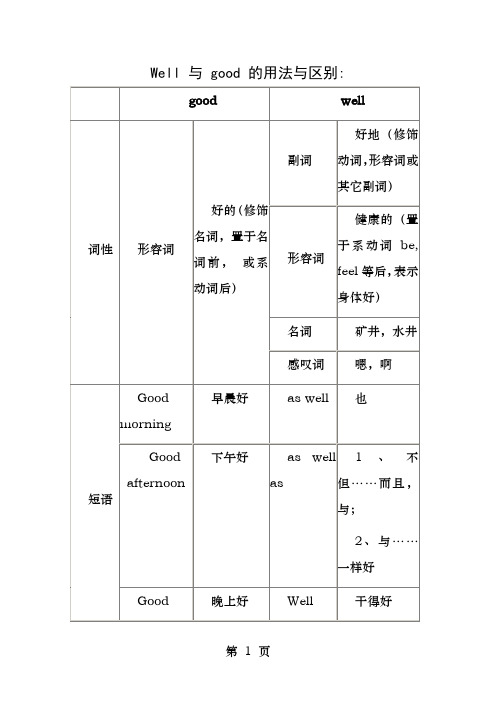
Well 与 good 的用法与区别:☆特别提醒:good与well作为“好”最主要的区别就是,good是形容词,修饰名词,well是副词,修饰动词。
well也能用作形容词,修饰名词,不过意思不是“好”,而是形容身体“健康的”。
相关例句:1. How good of you. 你真好!2. It’s good of you to let me come.承蒙邀请,安分感激。
3. She is good at tennis.他擅长网球。
4. He did his job pretty well.他的工作干得相当好。
5. ----How are you? ----I am quite well. 你好吗?我很好。
6. His children as well as his wife were invited to the party. 不但他的妻子而且他的孩子也被邀请参加聚会。
选用good 与well 填空:1. This dish tastes ________.2. It’s a ________ day for hiking.3. I don’t feel ________ this morning.4. ________, that’s true.5. How did you like the movie? _________, the story was good.6. Is this spring water _________ to drink?7. He is a __________ speaker of English.8. He speaks Spanish as _________ as English and French.9. He is________ at speaking English.10. Do you think this colour goes _________ with that one?11. I don’t know him _________.12. She was _________ satisfied with the result.13. It’s_________ to be home again.14. That’s a _________ joke.15. You look _______ in that dress.16. My grandmother is in ________ health.17. His eyesight and hearing are still _________.18. She swims _________, but her mother used to swim even better.19. She cooks as _________ as her mother does.20. His English is not as _________ as her English.翻译句子:1. 这个食物尝起来很好。
be good at与do well in的用法与区别的相关内容

be good at与do well in的用法与区别的相关内容,Ⅰ. be good at / in 意思接近于do well in. “在(某方面)出色;擅长……”be good at / in 强调一种笼统情况还有而do well in 可表示一种情况还有也可指在具体的,啊一次活动中表现出色be good at 的,啊反义词组为be poor (weak) at (in). do well in 的,啊反义词组为do badly in. 如①Mary is good at / in maths. = Mary does well in maths. 玛丽数学很好(指情况)= 玛丽数学学得很好②Tom did well in (不宜用be good at.指具体一次)that English test / sports meeting.汤姆在那次英语考试中(运动会中)考得很好(表现出色)③Wu Dong does badly in his lessons. = Wu Dong is weak / poor / at / in his lessons.吴冬功课不好(指情况)④Mei Ying did badly in the high jump 梅英在跳高比赛中成绩不好(具体一次还有不宜替换)⑤Mei Ying is weak / poor in / at high jump.梅英不善于跳高(指笼统情况)Ⅱ. do well 和do badly可单独运用还有表一种情况;而be good / weak / poor 一定要借助于介词in 或at还有强调在某一个方面还有才能表达一个完整的,啊意思如He does well / badly at school. 他在学校里功课很好/很差I hope I can help you嗯如果还是没看懂,那就去谷歌搜索下也可以be good at 后面动名词do well in 某一方面名词举例xiaoming is good at dancing .kity does well in siencegood和well的用法1. 基本文法说明good 是形容词,它的副词well 也很常见。
well和good的用法
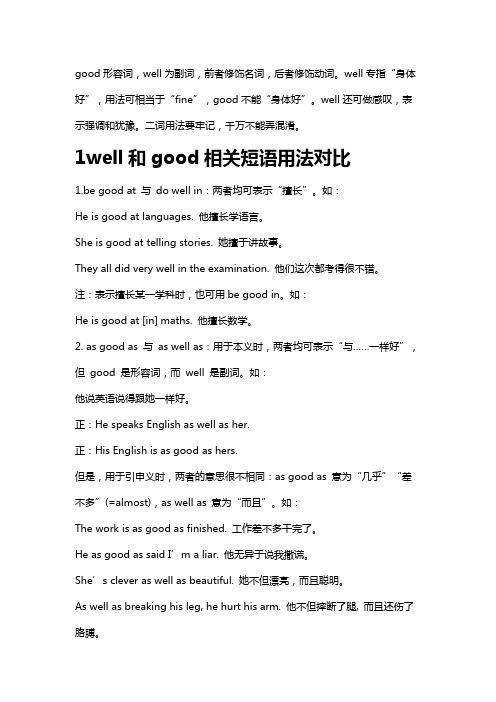
good形容词,well为副词,前者修饰名词,后者修饰动词。
well专指“身体好”,用法可相当于“fine”,good不能“身体好”。
well还可做感叹,表示强调和犹豫。
二词用法要牢记,千万不能弄混淆。
1well和good相关短语用法对比1.be good at 与do well in:两者均可表示“擅长”。
如:He is good at languages. 他擅长学语言。
She is good at telling stories. 她擅于讲故事。
They all did very well in the examination. 他们这次都考得很不错。
注:表示擅长某一学科时,也可用be good in。
如:He is good at [in] maths. 他擅长数学。
2. as good as 与as well as:用于本义时,两者均可表示“与……一样好”,但good 是形容词,而well 是副词。
如:他说英语说得跟她一样好。
正:He speaks English as well as her.正:His English is as good as hers.但是,用于引申义时,两者的意思很不相同:as good as 意为“几乎”“差不多”(=almost),as well as 意为“而且”。
如:The work is as good as finished. 工作差不多干完了。
He as good as said I’m a liar. 他无异于说我撒谎。
She’s clever as well as beautiful. 她不但漂亮,而且聪明。
As well as breaking his leg, he hurt his arm. 他不但摔断了腿, 而且还伤了胳膊。
冀教版八上-上 Unit5-8 知识要点
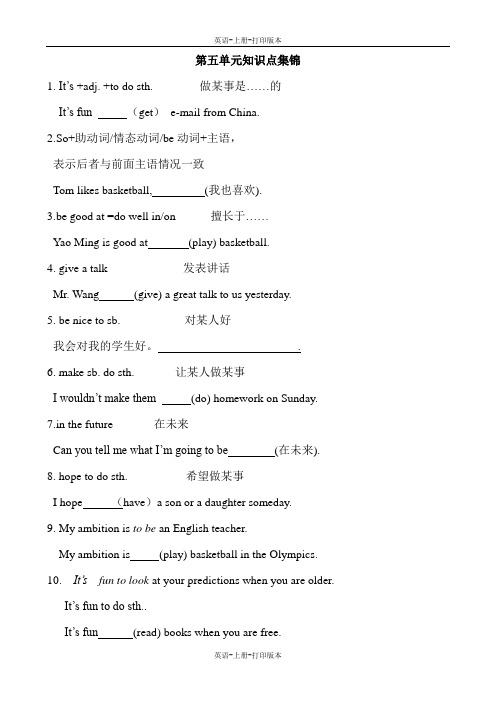
第五单元知识点集锦1. It’s +adj. +to do sth. 做某事是……的It’s fun (get)e-mail from China.2.So+助动词/情态动词/be动词+主语,表示后者与前面主语情况一致Tom likes basketball, (我也喜欢).3.be good at =do well in/on 擅长于……Yao Ming is good at (play) basketball.4. give a talk 发表讲话Mr. Wang (give) a great talk to us yesterday.5. be nice to sb. 对某人好我会对我的学生好。
.6. make sb. do sth. 让某人做某事I wouldn’t make them (do) homework on Sunday.7.in the future 在未来C an you tell me what I’m going to be(在未来).8. hope to do sth. 希望做某事I hope (have)a son or a daughter someday.9. My ambition is to be an English teacher.My ambition is (play) basketball in the Olympics. 10. It’s fun to look at your predictions when you are older.It’s fun to do sth..It’s fun(read) books when you are free.11. Fast is the opposite of slow .长是短的反义词。
12.too many/much 太多…There are (too many/too much)cars in the street.区别:many后加可数名词复数形式,much后加不可数名词13. a piece of advice 一条建议give sb. advice for sth. 为了某事给某人建议你能给我一些学习英语好的建议吗?14. make sb/sth + adj.What makes you (happy/happily)?15.in表示时间的用法是“在……后”,多用于一般将来时态中。
人教版八年级英语上第六单元知识点

八年级英语上册 unit6 知识点复习问知教育(乐宗宏辅导讲义)一)习惯用语:look the same=look like 看起来像 in some ways 在某些方面as you can see 正如你能看到的look different 看起来不同in common 共同的as +< 形容词 / 副词原级 > +as ,与,一样not as/so , as, , 不如, more than=over 多于, 超过be good at=do well in sth./doingsth. 爱好于, make sb. +do 使某人,have good grades 成绩优良be good with sb. 善于与某人相处call , at + 电话号码拨, 找, stop doing sth. 停止做某事stop to do sth. 停下来做某事begin with.. 以, 开始most of ,, 中的大多数primary school 小学both , and, 两者都laugh at , 嘲笑,my twin sister 我的双胞胎姐姐be outgoing 爱抛头露面shorthair 短发more athletic 更健美the same as 同,, 一样lots of 许多 3 centimeters taller 高了三厘米二)重点句型:1.I'm more outgoing than my sister .我比我妹妹更爱出风头。
2.He has shorter hair than Sam .他的头发比山姆的短。
3.Tom is more athletic than Sam .汤姆比山姆更健美。
4.Liu Ying is not as good at sports as her sister. 刘莹不如她姐姐擅长体育。
5.Both girls go to lots of parties .两个女孩都参加了许多晚会。
人教版英语八年级上册单词巧记句型语法剖析(Unit6I’mmoreoutgoingthanmysister)

初中英语学习材料madeofjingetieji八年级上册单词巧记+句型语法剖析Unit 6I’m more outgoing than my sister三眯剖析单词·巧记·典句·考点more []adj. 更;更多的;更大的【巧记提示】m+ore(矿石)【经典例句】We should show more concern for others.我们应当更关心别人。
【考点聚焦】1)more是many和much的比较级,也和部分双音节词和多音节词构成它们的比较级。
2)当“另外的”讲,常与some连用。
【活学活用】1.选择1)Would you like some ,please?A.moreB.otherC.elseD.others2)Do you have anything to tell me?A.someB.elseC.otherD.the others答案:1)A 2)Bthan []conj.比【巧记提示】than(比)→then(然后)【经典例句】Steel is stronger than iron.钢比铁强度大。
【考点聚焦】用于含有比较级的句子中,起连接的作用。
【活学活用】2.选择I prefer fishing I think it’s than running.A.more boringB.less boringC.the most boringD.boring答案:Bboth []pron. 两个(都);两者(都)【巧记提示】谐音为不(bo)是(th)【经典例句】You are both wrong.你们两个都错了。
【考点聚焦】1)both放在系动词之后,实义动词之前。
2)短语:both...and 两个都【活学活用】3.主谓一致练习1)Both she and I (be) going to do the cleaning.2)Mike (be) both tall and handsome.答案:1)are2)is Cmake []v.使;促使;迫使【巧记提示】make(使)→take(拿走)【经典例句】My mother made me babysit my little sister.我母亲让我照看我的小妹妹。
最新仁爱英语八年级上册 Unit1.topic3知识点归纳
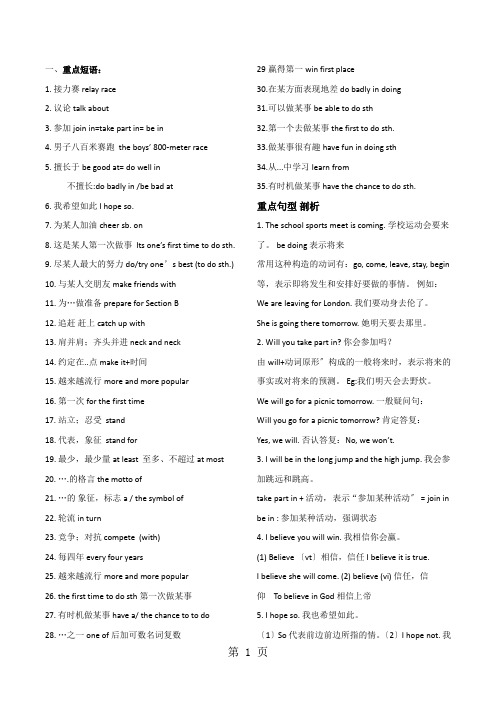
一、重点短语:1. 接力赛 relay race2. 议论 talk about3. 参加 join in=take part in= be in4. 男子八百米赛跑 the boys’ 800-meter race5. 擅长于 be good at= do well in不擅长:do badly in /be bad at6. 我希望如此 I hope so.7. 为某人加油 cheer sb. on8. 这是某人第一次做事 Its one’s first time to do sth.9. 尽某人最大的努力 do/try one’s best (to do sth.)10. 与某人交朋友 make friends with11. 为…做准备 prepare for Section B12. 追赶赶上catch up with13. 肩并肩;齐头并进 neck and neck14. 约定在..点 make it+时间15. 越来越流行more and more popular16. 第一次for the first time17. 站立;忍受 stand18. 代表,象征 stand for19. 最少,最少量at least 至多、不超过at most20. ….的格言 the motto of21. …的象征,标志a / the symbol of22. 轮流 in turn23. 竞争;对抗 compete (with)24. 每四年 every four years25. 越来越流行more and more popular26. the first time to do sth第一次做某事27. 有时机做某事 have a/ the chance to to do28. …之一 one of 后加可数名词复数29赢得第一win first place30.在某方面表现地差 do badly in doing31.可以做某事 be able to do sth32.第一个去做某事 the first to do sth.33.做某事很有趣have fun in doing sth34.从...中学习learn from35.有时机做某事 have the chance to do sth.重点句型剖析1. The school sports meet is coming. 学校运动会要来了。
be-good-at与do-well-in的用法与区别的相关内容

两个词组分别代表些许不同得意义也搭配不同的介系词,do well in 是在某 事上成功,而 be good at 是对某一方面特别在行。 C. 「没有好处」误用成 there’s no good~ 例:There’s no good making your father angry. (X) It’s no good making your father angry. (O) 虽然中文是说「没有好处」但是英文要用 it is no good + V-ing 表示做某件 事情没有好处没有意义! 1、good 常用来指人的品行好,或事物的质地好,也常用来向别人问好。 Miss Gao is a good teacher. (人好) Your picture is very good. (物好) Good morng. (问好) 2、fine 身体状况好,天气状况好 — How are you? — Fine, thanks. (身体状况好) It's a fine day today. (天气状况好) 另外,fine 也可以用来指人物的品行、事物的质地“特别出色”。 He is a fine boy. (人物的品行) The pen is fine. (事物的质地“特别出色”) 3、nice 指人或物的外观、相貌好,“美好的”、“美妙的”、“漂亮的”。 Lucy looks nice. (人的相貌好) The flowers are very nice. (物的外观好) Nice to meet you. 4、well 做形容词时,指人的身体好,健康好 — How is your father? — He's very well. well 常做副词,修饰动词用。 He speaks English well. 5、OK 最勤快,有时替 fine 站岗,有时替 well 值班,表示身体好。 — How are you? — Fine, thanks. And you? — I'm OK. OK 表示事物的完好无损,人的安然无羔。 — Is it broken? — No, it's OK. — Oh, sorry! Are you OK? OK 表示赞同别人的观点,“好的”。 — Let's go home. — Ok, let's go. 1. help sb. to do sth. 帮助某人做某事。 Can you help me to learn English ? 你能帮助我学英语吗? I can't help you to lift this stone. 我不能帮你搬这块石头。 help sb. with sth. 帮助某人做某事。 Please help me with my French. 请帮我学法语。 Can you help him with this work ? 你能帮助他完成这项工作吗? help 是及物动词,后接名词或代词作宾语,也可用于常用句型 help sb do /to do sth (动 词不定式可省去 to) ; help sb with sth ‘帮助某人做某事; cann't help doing sth 忍不住 做某事’如 He often helps others / me.He often helps me (to) study my English. He often helps me with my English.He can't help laughing .
well和good的用法区别有哪些

well和good的用法区别有哪些
good 只用作形容词不用作副词其副词形式用well, well 既可用作副
词也可用作形容词.
1well 和good 的用法有什幺不同从词性用法上比较
1.good 只用作形容词不用作副词其副词形式用well.
He speaks good English.他的英语说得好.
He speaks English well.他的英语说得好.
2.well 既可用作副词也可用作形容词.用作形容词时其用法很有限只表示“健康的”“恰当的”或“令人满意的”等.
She is very well.她身体很好.
Things are well with us.我们事事如意.
注一般说来w e ll用作形容词时只用作表语而不用作定语(如上例)但在美国英语中w e ll表示“身体健康”时有时也可用作定语.
二、从相关短语用法上比较
1.be good at 与do well in两者均可表示“擅长”.
He is good at languages.他擅长学语言.
She is good at telling stories.她擅于讲故事.
They all did very well in the examination.他们这次都考得很不错.
注表示擅长某一学科时也可用be good in.
He is good at [in] maths.他擅长数学.
2.as good as 与as well as用于本义时两者均可表示“与……一样好”但
good 是形容词而well 是副词.。
be good at 和do well in 英语题

be good at 和do well in 英语题"Be good at" 和 "do well in" 都是用来描述在某一领域或学科上表现优秀的表达方式,但它们在用法上略有不同。
1. "Be good at":
•用于描述一个人在某一领域或技能方面有天赋或表现得很好。
•通常接后面的名词、动名词或代词,表示某种具体的技能或领域。
示例:
• She is good at playing the piano.(她擅长弹钢琴。
)
• He is good at math.(他在数学方面表现很好。
)
2. "Do well in":
•用于描述一个人在某一学科、科目、考试或任务上取得良好的成绩或表现。
•后面通常接名词,表示某个学科或任务。
示例:
• She did well in the English exam.(她在英语考试中表现很好。
)
• They always do well in sports competitions.(他们在体育比赛中总是表现很好。
)
总体而言,"be good at" 更强调个人的天赋或技能,而"do well in" 更强调在特定任务、学科或考试中的良好表现。
1/ 1。
good和well的用法总结
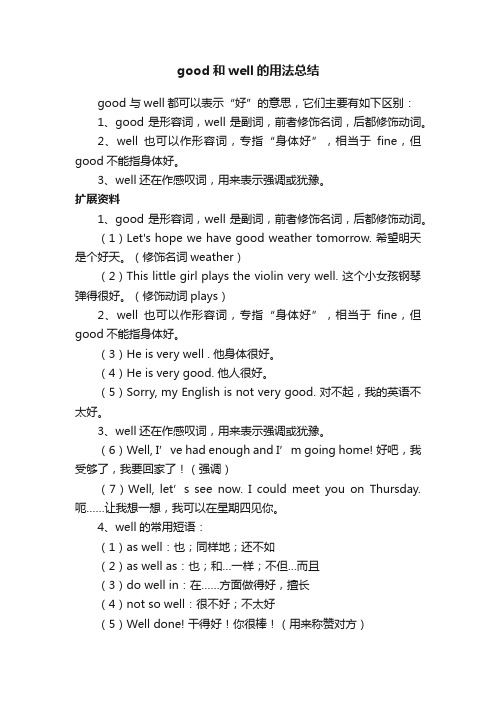
good和well的用法总结good 与well都可以表示“好”的意思,它们主要有如下区别:1、good是形容词,well是副词,前者修饰名词,后都修饰动词。
2、well也可以作形容词,专指“身体好”,相当于fine,但good不能指身体好。
3、well还在作感叹词,用来表示强调或犹豫。
扩展资料1、good是形容词,well是副词,前者修饰名词,后都修饰动词。
(1)Let's hope we have good weather tomorrow. 希望明天是个好天。
(修饰名词weather)(2)This little girl plays the violin very well. 这个小女孩钢琴弹得很好。
(修饰动词plays)2、well也可以作形容词,专指“身体好”,相当于fine,但good不能指身体好。
(3)He is very well . 他身体很好。
(4)He is very good. 他人很好。
(5)Sorry, my English is not very good. 对不起,我的英语不太好。
3、well还在作感叹词,用来表示强调或犹豫。
(6)Well, I’ve had enough and I’m going home! 好吧,我受够了,我要回家了!(强调)(7)Well, let’s see now. I could meet you on Thursday. 呃……让我想一想,我可以在星期四见你。
4、well的常用短语:(1)as well:也;同样地;还不如(2)as well as:也;和…一样;不但…而且(3)do well in:在……方面做得好,擅长(4)not so well:很不好;不太好(5)Well done! 干得好!你很棒!(用来称赞对方)5、good常用短语:(1)be good at:善于(2)be good for:对……有益(3)no good:很糟,没有用(4)make good:成功;赔偿;补偿(5)do good to:对……有好处;有用处(6)good job:好运;幸运的.事情;干的不错(用来称赞对方)(7)good idea:好主意,好想法;妙计(8)be in good health:身体健康(9)for good:永久地;一劳永逸。
八年级英语(下)第4单元Section B知识详解新目标

Unit 4He said I was hard-working.Section B1.I’m good at speaking.我擅长口语。
be good at/ for/ to辨析:(1) be good at表示“在……方面(学得、做得)好,擅长于”。
如:He is good at Maths. 他数学学得好。
She is good at playing basketball.她擅长打篮球。
注:be good at≥do well inShe is good at English.≥She does well in English.be good for 表示“对……有益处(好处),有利于……”。
如:Taking a walk after supper is good for your health.晚饭后散步对你的健康有益。
注:be good for 的反义词组为be bad for。
如:Watching TV much is bad for your eyes.过多看电视对你的眼睛有害。
be good to 表示“对……和善(仁善)”,相当于be kind to 。
如:She is very good to her students. 她对她的学生很好。
注:to 后接动词原形,则表示“适于……”。
如:Is this water good to drink? 这水适于喝吗?(2) be good at 和do well in辨析be good at 擅长,较笼统地指某一方面有特长、很优秀。
do well in在……成绩好,在...做得好,在……表现好,指在具体某一次活动或某一件事情中做得好或做得出色或指学校功课、成绩好。
现以例子来说明它们意思的区别:You are good at English你英语好,你擅长英语。
You do well in English你英语成绩好(英语成绩好,并不表示你的英语就很好了,比如你在学七年级的英语时很刻苦,成绩好,但尽管你的成绩很好,但你不能说你英语就很好了,你不能说你擅长英语,毕竟你学的只是七年级的英语,另外,说不定会半途而废呢,说不定你八年级英语成绩很差呢。
good at的不同表达方式

good at的不同表达方式"good at" 在英语中的不同表达方式有以下几种:
1. Do well in
- 例句:She does well in math problems.
- 意思:她在数学题上做得很好。
2. Excel in
- 例句:He excels in public speaking.
- 意思:他在公开演讲方面表现出色。
3. Be proficient in
- 例句:He is proficient in programming languages.
- 意思:他在编程语言方面很熟练。
4. Have a talent for
- 例句:She has a real talent for painting.
- 意思:她在绘画方面很有天赋。
5. Demonstrate skill/knowledge in
- 例句:They demonstrate great skill in playing chess.
- 意思:他们在下棋方面展现出了高超的技巧。
6. Be skilled at
- 例句:He is highly skilled at troubleshooting technical issues.
- 意思:他在解决技术问题方面非常熟练。
7. Show expertise in
- 例句:She shows expertise in ancient history.
- 意思:她在古代历史方面展现出专业知识。
每种表达都传达了与"be good at" 类似的含义,即在某一领域或活动中有出色的能力或表现。
- 1、下载文档前请自行甄别文档内容的完整性,平台不提供额外的编辑、内容补充、找答案等附加服务。
- 2、"仅部分预览"的文档,不可在线预览部分如存在完整性等问题,可反馈申请退款(可完整预览的文档不适用该条件!)。
- 3、如文档侵犯您的权益,请联系客服反馈,我们会尽快为您处理(人工客服工作时间:9:00-18:30)。
be good at与do well in的用法与区别的相关内容,
Ⅰ、be good at / in 意思接近于do well in、“在(某方面)出色;擅长……”
be good at / in 强调一种笼统情况还有而do well in 可表示一种情况还有也可指在具体的,啊一次活动中表现出色
be good at 的,啊反义词组为be poor (weak) at (in)、do well in 的,啊反义词组为do badly in、如①Mary is good at / in maths、= Mary does well in maths、玛丽数学很好(指情况)
= 玛丽数学学得很好
②Tom did well in (不宜用be good at、指具体一次)that English test / sports meeting、汤姆在那次英语考试中(运动会中)考得很好(表现出色)
③Wu Dong does badly in his lessons、= Wu Dong is weak / poor / at / in his lessons、吴冬功课不好
(指情况)④Mei Ying did badly in the high jump 梅英在跳高比赛中成绩不好
(具体一次还有不宜替换
)⑤Mei Ying is weak / poor in / at high jump、梅英不善于跳高
(指笼统情况)Ⅱ、do well 与do badly可单独运用还有表一种情况;而be good / weak / poor 一定要借助于介词in 或at还有强调在某一个方面还有才能表达一个完整的,啊意思
如He does well / badly at school、她在学校里功课很好/很差
I hope I can help you嗯如果还就是没瞧懂,那就去谷歌搜索下也可以
be good at 后面动名词
do well in 某一方面名词
举例xiaoming is good at dancing 、
kity does well in sience
good与well的用法
1、基本文法说明
good 就是形容词,它的副词well 也很常见。
good 也常搭配其它介系词一起使用。
2、错误发生情况及修正
A、把good 当作well 副词使用
例:Eric speaks English very good、(X)
Eric speaks English very well、(O)
艾瑞克英文说的很好。
记住good 只就是形容词用来修饰名词,如果遇到动词必须用well 来强调「好」。
例:My mother is a very good cook、
我妈就是个很棒的厨师。
例:She cooks very well、
她菜煮得很棒。
B、do well in (在~方面成功) 与be good at (对~在行) 介系词搭配错误
例:I hope my brother will do good in tomorrow’s exam、(X)
I hope my brother will do well in tomorrow’s exam、(O)
我希望弟弟明天的考试顺利成功。
例:Tom is good in playing basketball、(X)
Tom is good at playing basketball、(O)
汤姆篮球打得好。
两个词组分别代表些许不同得意义也搭配不同的介系词,do well in 就是在某
事上成功,而be good at 就是对某一方面特别在行。
C、「没有好处」误用成there’s no good~
例:There’s no good making your father angry、(X)
It’s no good making your father angry、(O)
虽然中文就是说「没有好处」但就是英文要用it is no good + V-ing 表示做某件
事情没有好处没有意义!
1、good 常用来指人的品行好,或事物的质地好,也常用来向别人问好。
Miss Gao is a good teacher、(人好)
Your picture is very good、(物好)
Good morng、(问好)
2、fine 身体状况好,天气状况好
— How are you? — Fine, thanks、(身体状况好)
It's a fine day today、(天气状况好)
另外,fine 也可以用来指人物的品行、事物的质地“特别出色”。
He is a fine boy、(人物的品行)
The pen is fine、(事物的质地“特别出色”)
3、nice 指人或物的外观、相貌好,“美好的”、“美妙的”、“漂亮的”。
Lucy looks nice、(人的相貌好)
The flowers are very nice、(物的外观好)
Nice to meet you、
4、well 做形容词时,指人的身体好,健康好
— How is your father? — He's very well、
well 常做副词,修饰动词用。
He speaks English well、
5、OK 最勤快,有时替fine 站岗,有时替well 值班,表示身体好。
— How are you? — Fine, thanks、And you? — I'm OK、
OK 表示事物的完好无损,人的安然无羔。
— Is it broken? — No, it's OK、
— Oh, sorry! Are you OK?
OK 表示赞同别人的观点,“好的”。
— Let's go home、— Ok, let's go、
1、help sb、to do sth、帮助某人做某事。
Can you help me to learn English ? 您能帮助我学英语不?
I can't help you to lift this stone、我不能帮您搬这块石头。
help sb、with sth、帮助某人做某事。
Please help me with my French、请帮我学法语。
Can you help him with this work ? 您能帮助她完成这项工作不?
help 就是及物动词,后接名词或代词作宾语,也可用于常用句型help sb do /to do sth (动词不定式可省去to) ; help sb with sth ‘帮助某人做某事; cann't help doing sth 忍不住做某事’如He often helps others / me、He often helps me (to) study my English、
He often helps me with my English、He can't help laughing 、。
